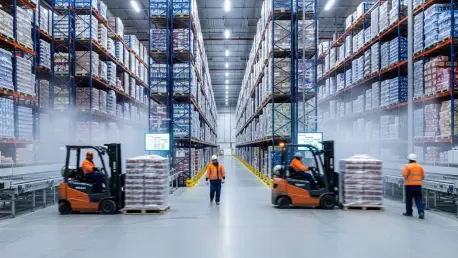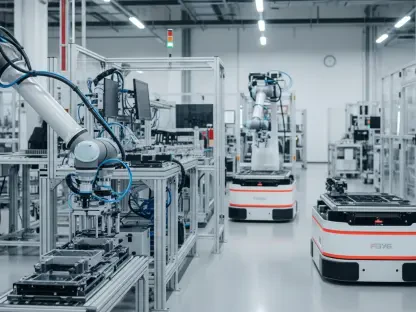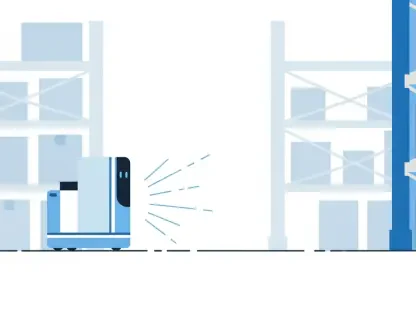Overview of the Cold Storage Industry in Fresh Produce
Imagine a world where fresh apples and pears lose their crispness before reaching the market, simply due to inadequate storage. The cold storage industry plays a pivotal role in preventing such scenarios, ensuring that perishable produce retains its quality from farm to table. This sector is a cornerstone of the global food supply chain, particularly for fresh fruits and vegetables, where temperature-controlled environments are essential to extend shelf life and maintain nutritional value. With the market size projected to grow significantly over the coming years, driven by rising demand for fresh goods, the industry stands at a critical juncture of innovation and scalability.
Key players in this space include specialized storage solution providers and logistics firms that cater to agricultural giants and retailers alike. The focus on maintaining precise conditions—often between 0 and 5 degrees Celsius—has made cold storage a highly technical field. Challenges such as energy consumption and space optimization are pushing companies to adopt advanced systems that balance efficiency with sustainability. The market’s expansion reflects not just consumer demand but also the globalization of food trade, requiring robust infrastructure to handle diverse produce under stringent standards.
Technological advancements are reshaping how cold storage operates, with automation, IoT-enabled monitoring, and modular racking systems becoming standard. These innovations aim to minimize spoilage and reduce operational costs, addressing the growing need for reliable storage as production volumes increase. As urbanization drives the need for centralized distribution hubs, the industry is witnessing a surge in demand for tailored solutions that can adapt to varying scales and environmental conditions, setting the stage for transformative collaborations.
The Collaboration Between AR Racking, Begra, and FruitMasters
Scope and Objectives of the Project
A landmark partnership between AR Racking, a global leader in industrial storage systems, Begra, its trusted distributor in the Netherlands, and FruitMasters, a major fresh fruit operator, has redefined cold storage capabilities. The ambitious project focused on renovating and expanding drive-in racking systems across more than 300 ULO (Ultra-Low Oxygen) cold storage rooms. These facilities are vital for preserving high-value fruits like Kanzi apples and Migo pears, sourced from over 400 local producers, under tightly controlled temperatures ranging from 0 to 5 degrees Celsius.
The primary objective was to enhance storage capacity while ensuring the strict environmental conditions necessary for fruit preservation were met without compromise. This required not just an upgrade of physical infrastructure but also a meticulous approach to design that could withstand the harsh, low-temperature setting. The collaboration aimed to create a seamless system that would support FruitMasters’ operational scale while adhering to the highest industry benchmarks for quality and safety.
Beyond mere expansion, the project sought to address long-term durability and efficiency in a sector where downtime can lead to significant losses. By focusing on precision engineering, the partnership ensured that every component was tailored to the unique needs of cold storage, safeguarding product integrity. This initiative stands as a testament to the importance of strategic alliances in tackling specialized logistical demands with finesse.
Technical Innovations and Integration
At the heart of this transformation was AR Racking’s cutting-edge engineering, which delivered storage solutions meeting the rigorous demands of a cold storage environment. Advanced design techniques ensured that the new drive-in racking systems were not only robust but also fully compatible with the existing infrastructure at FruitMasters’ facilities. This compatibility minimized disruptions during installation, allowing operations to continue with minimal interference while upgrades were implemented.
Integration was a key focus, with systems engineered to align seamlessly with the specific layout and operational flow of over 300 storage rooms. The technology incorporated features to optimize space utilization, a critical factor in cold storage where every cubic foot counts. Such innovation reflects a deep understanding of the sector’s needs, ensuring that the racking could handle the weight and volume of fruit pallets under extreme conditions without faltering.
Begra, as the local distributor, played an indispensable role in maintaining technical precision throughout the project. Their expertise ensured that any maintenance needs were addressed swiftly, with spare parts readily available to prevent operational hiccups. This synergy between AR Racking’s innovation and Begra’s on-ground support created a robust framework that enhanced both efficiency and reliability for FruitMasters’ storage operations.
Challenges in Cold Storage and FruitMasters’ Specific Needs
Maintaining consistent temperatures in cold storage environments poses a significant challenge, as even minor fluctuations can compromise the quality of perishable goods. Energy costs further complicate the equation, with facilities requiring substantial power to sustain low temperatures, often straining budgets. These issues are compounded by the need for space optimization, as operators must store large volumes of produce in limited areas without risking damage or spoilage.
FruitMasters faced additional hurdles with their older racking systems, many of which had sustained damage over time, impacting storage reliability. Sourcing spare parts for these outdated setups became increasingly difficult, leading to prolonged downtime during repairs and escalating maintenance expenses. Such inefficiencies threatened operational continuity, prompting a critical need for a modern solution that could address these pain points comprehensively.
The shift to AR Racking’s systems offered a way forward with flexible, high-quality designs that minimized disruptions. These solutions were engineered for quick installation and easy adaptability, ensuring that replacements or upgrades could be executed without halting operations. By prioritizing immediate availability of components, the new infrastructure significantly reduced long-term costs, providing FruitMasters with a sustainable approach to managing their storage challenges.
Importance of Reliability and Compliance in Storage Solutions
Reliability in storage systems is paramount in cold storage, where any failure can lead to spoilage and financial loss. Racking must endure constant low temperatures and high humidity while supporting heavy loads, making durability a non-negotiable attribute. A dependable system ensures operational continuity, preserving the freshness of fruits and vegetables critical to market competitiveness and customer satisfaction.
Compliance with industry standards adds another layer of importance, as cold storage facilities must meet strict safety and efficiency regulations to protect both products and workers. Adhering to these guidelines not only mitigates risks but also enhances trust among stakeholders, ensuring that operations align with best practices. This adherence is especially crucial in environments handling sensitive produce, where lapses can have far-reaching consequences.
Dirk Jan Brommersma, Shipping Manager at FruitMasters, underscored the value of AR Racking’s solutions in this context, highlighting their robustness and adaptability. These qualities provided a safeguard against unexpected failures, ensuring that the storage infrastructure could handle daily demands without compromise. Such reliability translates into confidence for operators, knowing their systems are built to maintain product quality under the most challenging conditions.
Future-Readiness and Industry Trends in Cold Storage
The cold storage sector is increasingly moving toward modernization, with a strong emphasis on upgrading infrastructure to boost efficiency and sustainability. Operators are investing in systems that reduce energy consumption while maximizing storage capacity, aligning with global efforts to minimize environmental impact. This trend reflects a broader recognition that outdated setups can no longer meet the demands of a rapidly evolving market.
AR Racking’s solutions have positioned FruitMasters to capitalize on these shifts, offering energy-efficient designs that support both current needs and future growth. The durable, modular nature of the racking systems allows for scalability, ensuring that the company can adapt to increasing production volumes or changing requirements over time. Such foresight is invaluable in an industry where agility often determines competitive advantage.
On a wider scale, the industry is witnessing a pivot toward innovative, customized storage solutions tailored to specific operational challenges. AR Racking stands as a strategic partner in this transformation, leveraging expertise to deliver systems that anticipate future demands. Their role in driving progress through advanced engineering and collaborative execution highlights a commitment to shaping the next era of cold storage logistics.
Conclusion: Impact and Implications of the Collaboration
Looking back, the collaboration between AR Racking, Begra, and FruitMasters marked a significant milestone in enhancing cold storage capabilities for fresh produce. The project successfully addressed immediate challenges like damaged racks and parts scarcity, while also elevating operational efficiency through meticulously designed systems. This partnership delivered a tangible impact, ensuring that hundreds of storage rooms operated at peak performance.
Beyond the immediate outcomes, the initiative set a precedent for how tailored storage solutions could transform industry practices. It highlighted the potential for strategic alliances to solve complex logistical issues with precision and innovation. The focus on durability and energy efficiency offered a blueprint for other operators seeking to modernize their facilities.
Moving forward, stakeholders should consider similar collaborations to tackle evolving challenges in cold storage, prioritizing investments in adaptable and sustainable infrastructure. Exploring partnerships with specialized providers can unlock new efficiencies, ensuring resilience in an increasingly competitive landscape. This case serves as a compelling reminder that proactive upgrades, backed by technical expertise, are essential steps toward securing long-term success in preserving the freshness of perishable goods.









